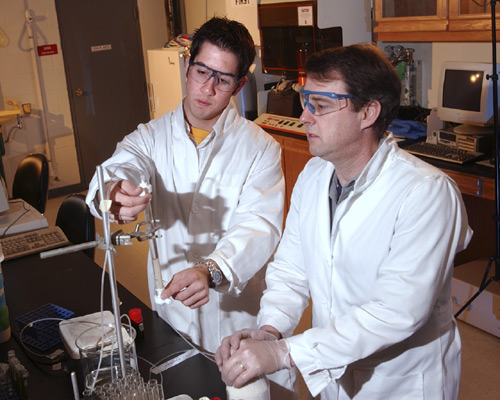Biochemistry major Steve Presciutti ’05 (Wilkes-Barre, Pa.) presented collaborative research on contaminated water and treatment programs at the 18th annual National Conference on Undergraduate Research April 15-17, hosted this year by Indiana University-Purdue University at Indianapolis.
“Our multidisciplinary team developed a cost-effective treatment technology to decrease the concentration of perchlorate, which has been linked with health problems concerning hormone production,” says Presciutti. The goal was to reduce levels from 2000 parts per billion to 4 parts per billion in domestic drinking water, he says.
“Our initial design consisted of using bacteria collected from a wastewater treatment plant that reduces perchlorate to appropriate levels of chlorine and oxygen,” he adds. “We grew the bacteria in a packed sand bed before running the contaminated sample through it. Afterwards, the water sample was sterilized and then stored for residential use. If perchlorate levels were not low enough, then we’d add an additional treatment step, such as an ion exchanger, in order to obtain low enough concentrations.”
Presciutti took part in the study with a dozen other students from diverse backgrounds:
- Marquis Scholar Andrew Baker ’06 (Seattle, Wash.), pursuing a B.S. in civil engineering and B.A. in international studies;
- A.B. engineering major Tim Bruss ’04 (Summit, N.J.);
- chemical engineering major Paul Dimick ’05 (Quakertown, Pa.);
- Marquis Scholar and civil engineering major Joe Goodwill ’04 (Camden, N.Y.);
- Trustee Scholarship recipient and chemical engineering major Mike Kauffman ’05 (Parkesburg, Pa.);
- Marquis Scholar and biology major Chuck Lemken ’06 (Emerson, N.J.);
- A.B. engineering major Brett Mollenhauer ’04 (Pitman, N.J.);
- Chemical engineering major Matt Puglisi ’05 (West Hempstead, N.Y.);
- A.B. engineering major Bryan Shanahan ’04 (Sandy Hook, Conn.);
- Geology major Trish Slemmer ’04 (Quakertown, Pa.);
- A.B. engineering major Kristen Tull ’06 (Sicklerville, N.J.);
- Marquis Scholar and chemical engineering major Ben Ward ’05 (Monroe, Conn.)
The problem of contamination is particularly strong in the southwestern portion of the country. Perchlorate is a byproduct of industrial production, such as the manufacture of fireworks and rocket fuel, explains Presciutti.
“Levels are too high in some California communities which have been forced to close down their drinking wells,” he says. “This is very dangerous stuff that affects the thyroid. The system we have designed appears to be more powerful than alternative means. We hope to be able to market it to the industrial sector, which right now faces no stringent EPA regulation.”
The multi-faceted nature of the study is what attracted him, Presciutti says. “Our design considered implementation issues and included an economic analysis, a safety plan, and a public involvement plan.”
“This project gave me the opportunity to pursue my intellectual curiosity and scientific thought processes in a real-world, hands-on application. Not only did I learn academic lessons, I learned personal skills on working with a team toward a common goal,” he adds.
For Art Kney, assistant professor of civil and environmental engineering, the project, which also relied on the talents of Sharon Jones and David Veshosky, associate professors of civil and environmental engineering, “is a true model of interdisciplinary study. Bringing together students of diverse backgrounds gave us fresh perspectives. Steve was just great to work with. He was very much a hands-on participant, tracking down manufacturers on the telephone, going through the literature. He did everything possible to make this project go.”
“Professor Kney especially made me feel welcome; he made me feel like one of the engineers,” adds Presciutti with a laugh. “One of the joys of a Lafayette education is that you never get boxed in by your major or your professors. You always feel welcome to push the boundaries as much as you dare to. I know at a bigger school, my opportunities for research and my chance to develop a closeness with professors just would not have happened.”
Presciutti was both excited and nervous to work on an engineering project as a biochemistry major.
“I had to work with a whole new set of students and a whole new group of professors. Everyone made me feel part of the team, even though I lacked an engineering background,” he says.
A tenor, Presciutti sings with the Concert Choir and the Madrigal Choir. He is a member of the board of directors of the Arts Society and serves as secretary for the campus chapter of the American Chemical Society. He plays intramural soccer and serves as a tutor in chemistry and physics.
Looking to the future, Presciutti says he plans to go to medical school and believes that his Lafayette education “has given me the tools to pursue my goals.”
He is a graduate of James M. Coughlin High School.
As a national leader in undergraduate research, Lafayette sends one of the largest contingents to the National Conference on Undergraduate Research each year. Forty-two students were accepted to present their work at the annual conference this month.

A National Leader in Undergraduate Research. Steve Presciutti ’05 presented research on contaminated water treatment with Arthur Kney, asst. prof. of civil engineering, and others at the 18th National Conference on Undergraduate Research.
